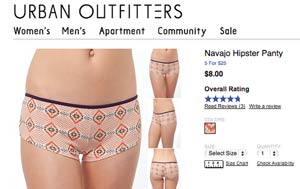Court rules Urban Outfitters trial will stay in New Mexico
By Bill Donovan
Special to the Times
WINDOW ROCK, January 24, 2013

For the past year, the Navajo Nation has been in the New Mexico federal court arguing that its trademark rights to the name "Navajo" were violated by Urban Outfitters in 2009 and in 2010 when they started selling some 20 products using the name Navajo or Navaho.
In June 2011, the Navajo Department of Justice sent the company a letter ordering them to "cease and desist" naming products after the tribe's name. DOJ also stated in its letter that the use of the word was a violation of federal trade laws because it gave the impression that the products that were being sold had some connection to the Navajo tribe or its members, which it did not.
Then, in October, the dispute went viral when a blog from a Navajo woman Sasha Houston Brown, used the Columbus Day holiday to blast the company for making a mockery of the Navajo name by offering products such as Navajo panties.
At the time, the company said it had done no wrong and was going to continue the product with the Navajo name, but a week later the company backed down and removed the name Navajo from the products, substituting, in some case, the word "Indian."
"Urban Outfitters appears to have caved to the Navajo Nation," the Los Angeles Times reported on Oct. 19.
The next day, Navajo DOJ officials released a statement saying that the company's decision to remove the Navajo name was viewed by tribal officials as "positive actions" and said that if the company has also ceased use of the name Navajo throughout all of its operations, these would be "encouraging steps by the company towards amicably resolving this matter."
But a little more than four months later, the Navajo Nation filed its lawsuit asking that the company be penalized for violating the tribe's copyright.
In August, fearing that the tribal attorneys would file a motion for a preliminary injunction, the company agreed to voluntarily refrain from using the word Navajo in the sale of clothing and jewelry as well as accessories.
But the Navajo tribe conducted an investigation and discovered that at the time the company was saying that it would not label any of its products as Navajo, they found Urban Outfitters offering for sale a cap and other items at one of their stores in Evanston, Ill. with tags labeling them as "Navajo."
Shortly after that, the company filed a motion in the New Mexico federal court asking that the venue be changed from New Mexico to Pennsylvania where the company has its headquarters.
They had several arguments.
One of them was that New Mexico was not the proper home for the Navajo Tribe since the tribal headquarters is located in Arizona and "the overwhelming majority of its territory and tribal members are located outside New Mexico."
They also argued that it would be convenient for the witnesses to be called for the trial, since Pennsylvania is where most of the company's employees who will testify work. But the Navajo attorneys also pointed out that many of their witnesses live in New Mexico or surrounding states.
The tribe plans to have a number of Navajo artisans testify at the hearing. All of these will testify that they produce articles similar to the ones sold by Urban Outfitters and all live in the Southwest so it would be more convenient for them to have the case heard in New Mexico.
As for the argument that it would be more convenient for the company to have the case heard in Pennsylvania, the tribal attorneys pointed out that the company, which had sales in 2012 of approximately $2.5 billion, is able to afford the costs of sending its witnesses to New Mexico than the tribe has in doing it in Pennsylvania.
Urban Outfitters attorneys also accused the Navajo Nation of forum shopping, filing in a state that is viewed as being more favorable to their cause.
But the ruling by the New Mexico court said that, "Both parties equally appear to be forum-shopping for convenience" and threw out that argument.
The final argument presented by Urban Outfitters was in regards to the dockets at the courts in New Mexico and Pennsylvania.
Civil cases in eastern Pennsylvania come to trial in an average of 20-and-a-half months, while in the New Mexico courts it takes about 24 months.
"This public interest factor," argued the company, "thus weighs in favor of transfer."
But when all things were taken into consideration, the New Mexico court rejected the transfer.
"Although some of the factors weigh in (Urban Outfitter's) favor, transferring this case would ultimately do little more than shift the balance of inconvenience from (the company to the tribe)," the ruling stated.

